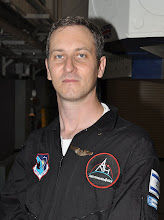 |
| USS-Enterprise Sick Bay |
Having the common cold on Earth is nothing to write about. But NASA takes no chances. Every effort is made to avoid astronauts getting sick in space. Astronauts are mostly in isolation several days before launch, as any impairment could jeopardize the mission and crew safety. Buzz Aldrin and Neil Armstrong were also in isolation after coming back from the moon to be on the safe side in case some germs unique to the moon got a ride to Earth. Ken Mattingly was supposed to be on Apollo 13, the US space flight probably most known for its mishaps yet successful outcome (no human life lost), but got grounded for being exposed to measles. Mattingly didn't get sick but Fred Haise did and vomited due to an infection and lack of water, a lot messier and risky at micro-gravity on the way to the moon in a crippled vessel.
There are medical conditions that are induced by space flight. Mostly known is loss of muscle and bone mass. Bone gets replenished all the time, a process encouraged by impact and gravity. In micro gravity, the process is slowed down by the lack of impact and gravity and hence requires strict exercise regimes to minimize the effect. Muscles lose mass as they don't hold the body weight like they do on Earth. Another space related medical problem is cosmic radiation, which depending on the location (low Earth orbit or beyond) and time, may increase chances of getting Cancer, much like ionising radiation on Earth. Astronauts are also known to use Dramamine patches to mitigate the motion-sickness like effects of getting accustomed to micro-gravity (space adaptation syndrome).
Back to Earth illnesses in space. The current policy of practically isolating astronauts before missions generally works for now. I still have to wonder what happens to a person after dwelling for an extended period of time on the International Space Station in terms of their immune system - do they lose some of their immunity to common diseases like kids when going to preschool for the first time? Even if not, when missions get even longer, which may be the case when Mars becomes a permanent residence of humans, I suspect we'll start seeing people needing some kind of shots to prevent them from getting sick after coming back, or possibly they will take those with them to take on the long way back.
What about conditions that will develop in space? An astronaut appendicitis may flare up and burst half way to Mars or a gall bladder may need removal on Mars. Will the solution be taking a gifted medical doctor / surgeon on every mission or will remote surgery be used? Doing the latter will pose challenges considering the latency of communication coming from Mars (a minimum of a little over 3 minutes) or even the moon (a little over a second) and the split second decisions that surgeons and doctors sometimes have to make to save a patients life.
 |
| Star Trek Voyager Doctor |
I admit, I might be thinking about this wrongly. By the time a mission to Mars takes place, we should see advances in medicine that will facilitate this aspect of space travel. Those advances will probably end up helping many more people on Earth than astronauts, but they will be an absolute must for these long missions. Of course, what we can only aspire for is the doctor from Star Trek Voyager - holographic, never sleeping and a know-it-all attitude (OK, maybe we can do without that...).
I'll leave you with two related links - a page showing the medical history of spacefarers, and another one which discusses space medicine - its origins, space related conditions and as well as advances in Earth medicine that originated from the early years of human space exploration.

 Space Shuttle Launch Poll Results
Space Shuttle Launch Poll Results














1 comment:
EXCELLENT post! Having experienced issues with muscles, bones, balance, immunosuppression, etc. in my sims, I can tell you micro-gravity ain't for sissies! Luckily, most of it quickly rights itself once you are "back on Earth"... but of course that gets more difficult the longer the mission.
I also often wonder what will happen on the way to Mars if there is some surgical emergency? I hope astronauts will get appendectomies beforehand... but I don't believe they do now. Seems risky! They have done successful tests of surgery on animals during parabolic flights though.
Post a Comment